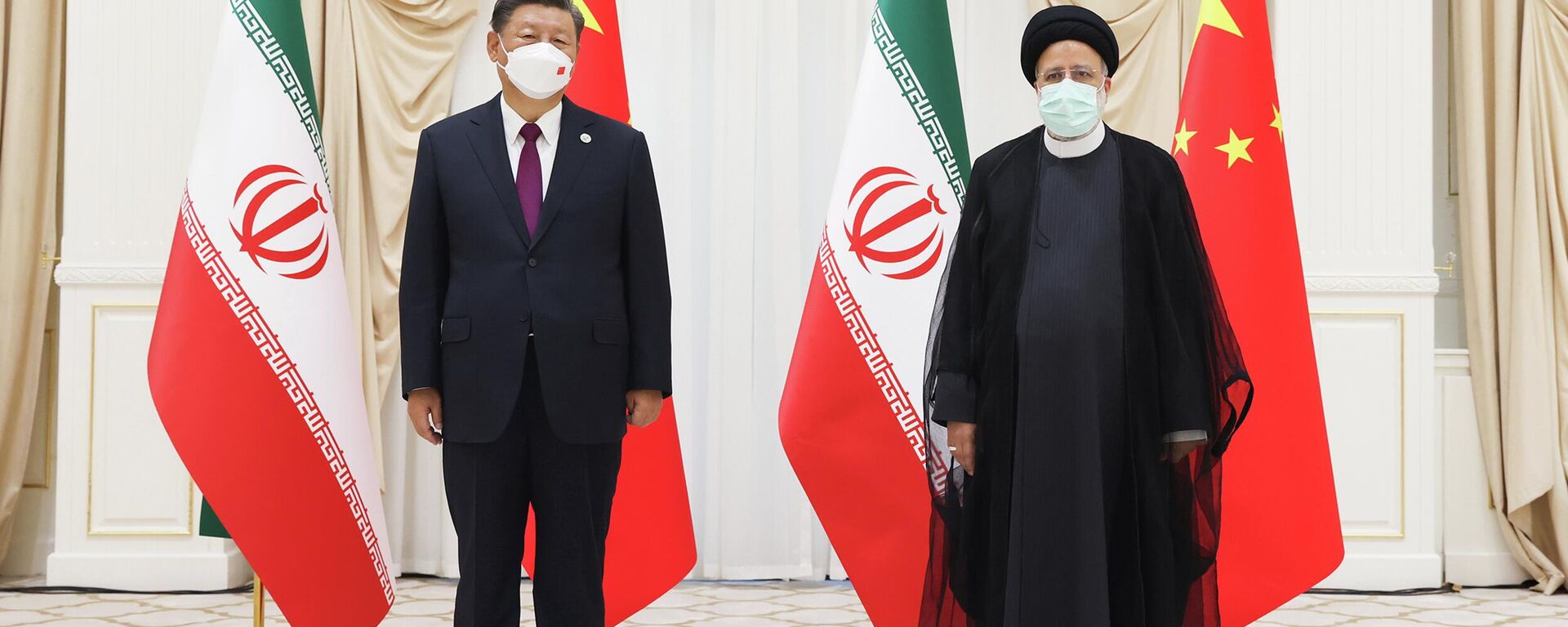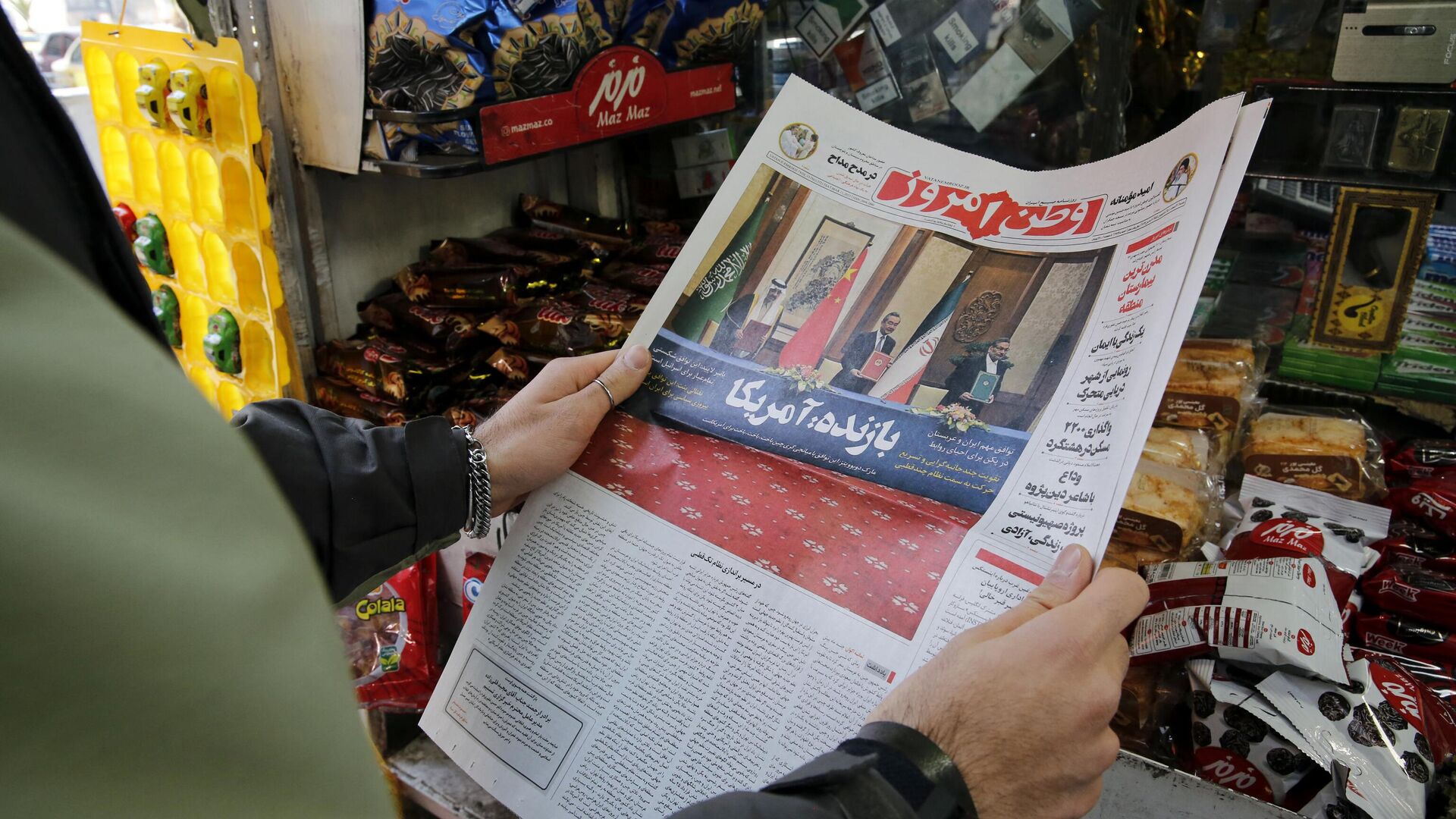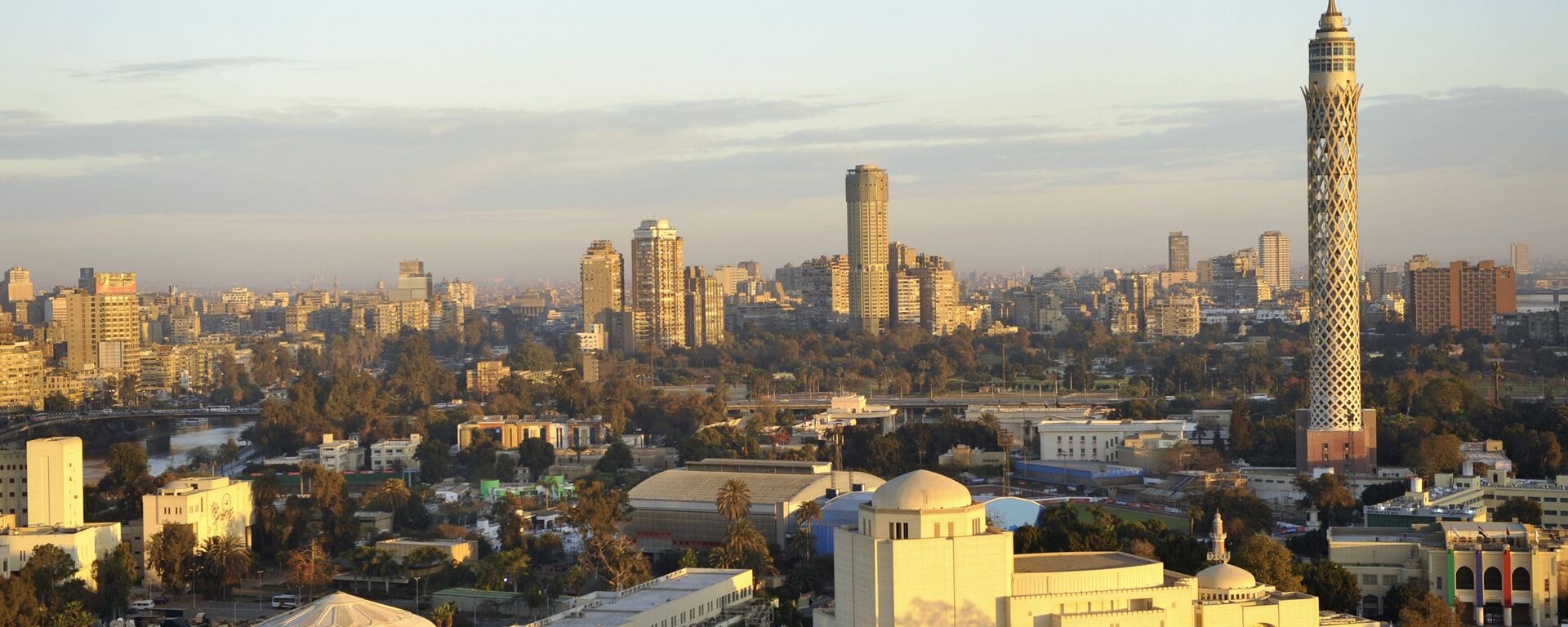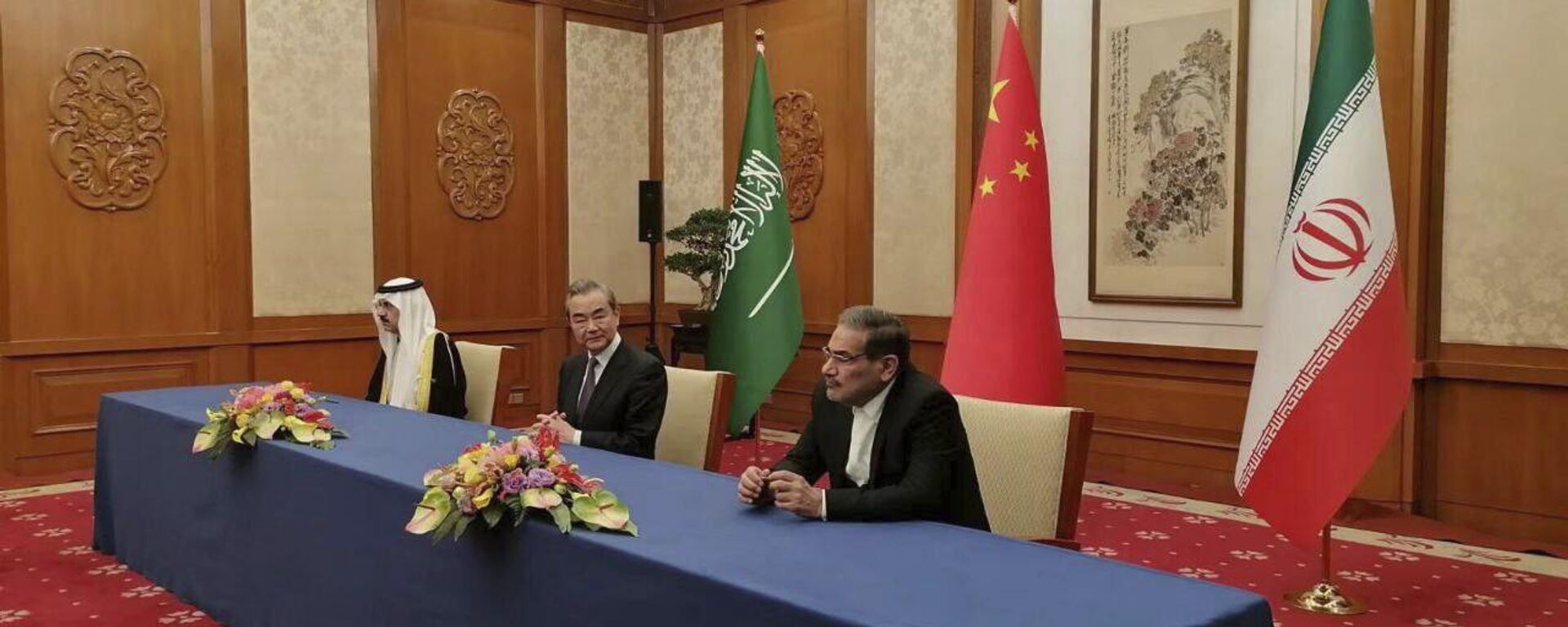https://sputnikglobe.com/20230311/china-brokered-iran-saudi-deal-threatens-to-push-us-out-of-the-gulf-and-washington-knows-it-1108298905.html
China-brokered Iran-Saudi Deal Threatens to Push US Out of the Gulf and Washington Knows It
China-brokered Iran-Saudi Deal Threatens to Push US Out of the Gulf and Washington Knows It
Sputnik International
Negotiators from long-time regional rivals Iran and Saudi Arabia signed a surprise agreement in Beijing on Friday on the normalization of relations, the reopening of embassies and the resumption of cooperation on security, trade and investment. The deal, which came after years of grueling negotiations, was met with sour grapes in Washington.
2023-03-11T19:15+0000
2023-03-11T19:15+0000
2023-03-11T19:25+0000
world
saudi arabia
iran
china
us
https://cdn1.img.sputnikglobe.com/img/07e7/03/0b/1108298748_0:160:3073:1888_1920x0_80_0_0_fc40dda07314eb87f281dd25edf079e2.jpg
The Biden administration’s utter lack of involvement in the negotiations which culminated in the Iran-Saudi diplomatic deal secured by China is a warning sign signaling the waning of Washington’s influence and power in the Middle East, virtually all major US media analyses covering the story have admitted.“If this deal can be sustained – regardless of what the interest was or who sat down at the table – if it can be sustained, and the war in Yemen can end, and Saudi Arabia doesn’t have to continually try to defend itself against attacks from the Houthis who are funded and supported by Iran, in the end we welcome that,” National Security Council spokesman John Kirby said in a press briefing on Friday, putting a brave face on the sobering development.“It really does remain to be seen whether the Iranians are going to honor their side of the deal,” Kirby repeated, adding that the US was engaged in its own “effective combination of deterrence and diplomacy” vis-à-vis Iran.White House press secretary Karine Jean-Pierre echoed Kirby’s sentiments, telling reporters Friday that the US welcomed “any efforts to help end the war in Yemen and de-escalate tensions in the Middle East.”“That is one of the reasons why the president – you saw him travel in – over the summer to have those conversations. De-escalation and diplomacy, together with deterrence, are key pillars of the policy that the president – that President Biden put out – outlined during his visit in July in the region,” the spokeswoman said.But Friday’s rapprochement was about much more than just “ending the war in Yemen,” US media covering the story have admitted.“Iran-Saudi Pact Is Brokered by China, Leaving US on Sidelines,” the New York Times’ headline read before being revised to “Chinese-Brokered Deal Upends Mideast Diplomacy and Challenges US.” The self-described paper of record indicated that the agreement signaled “at least a temporary reordering of the usual alliances and rivalries” in the region, and China’s growing global diplomatic clout, with Beijing said to have “suddenly transformed themselves into a new power player” out of a nation traditionally playing second fiddle to Washington. DC think tank analysts confirmed to the newspaper that the pact was “a big deal” and that the US had proven itself unable to broker an analogous agreement.The Washington Post gave off similarly humdrum and depressing vibes, with the lead to its report reading “After decades of US failures in the region, China takes a turn as Middle East power broker.”Business Insider took a more provocative approach, suggesting Riyadh’s move wasn’t so much a “slap in the face” as a “middle finger to Biden,” signaling a new low point in traditionally strong Saudi-US ties.CNN, meanwhile, offered a curiously forthright reflection about the Iran-Saudi deal’s global implications in terms of the reordering of the world order away from US unipolarity, characterizing the agreement as a “signal” to “the start of a new era, with China front and center.”Beltway politics-focused outlet The Hill emphasized that the China-brokered deal further “undercuts the posture of the US in the region” after the 2021 withdrawal from Afghanistan and the purported paring down of the US troop presence in Syria. The only hope for the US, a think tank researcher told the outlet, was that the Saudis and the Iranians wouldn’t be able to put aside their differences for long.“It remains to be seen if they can have a meaningful dialogue. Opening up embassies is not the same as having a meaningful dialogue,” Middle East Institute Iran program director Alex Vatanka said.‘Victory for Dialogue’Chinese top diplomat Wang Yi hailed the Iran-Saudi deal a “victory for dialogue” and “a victory for piece,” calling it “significant good news” in a world wracked by violence and uncertainty.The agreement is the product of many years of intense, behind the scenes negotiations by Iranian and Saudi diplomats, including the late Revolutionary Guards Quds Force commander Qasem Soleimani, who was killed in a US missile strike in Baghdad in January 2020 while engaging in Iraq-brokered indirect negotiations with Saudi officials.Iran and Saudi Arabia have been regional rivals for decades, with tensions rising after the Iranian Revolution of 1979, which brought to power an Islamic Republican government, sparking a bitter competition for leadership of the Islamic World. Tensions have been exacerbated by Riyadh’s traditional close ties with the United States, which Tehran formally dubs the “Great Satan.” The two countries broke off relations entirely in 2016 after the execution of a Shia Saudi cleric, and attacks on Saudi diplomatic missions inside the Islamic Republic, with Friday’s agreement meant to put an end to years of bad blood based on religious differences and geopolitics.
https://sputnikglobe.com/20230311/egypt-lauds-saudi-iranian-detente-as-important-step-toward-easing-regional-tensions-1108297720.html
https://sputnikglobe.com/20230311/historic-saudi-iran-deal-proves-major-setback-for-us-but-raises-questions-about-jcpoa-lifeline-1108278478.html
https://sputnikglobe.com/20230310/lapid-says-resumption-of-saudi-iranian-relations-a-dangerous-failure-of-israels-foreign-policy--1108275005.html
https://sputnikglobe.com/20221214/china-committed-to-developing-strategic-partnership-with-iran-vice-premier-1105446635.html
saudi arabia
iran
china
Sputnik International
feedback@sputniknews.com
+74956456601
MIA „Rossiya Segodnya“
2023
News
en_EN
Sputnik International
feedback@sputniknews.com
+74956456601
MIA „Rossiya Segodnya“
Sputnik International
feedback@sputniknews.com
+74956456601
MIA „Rossiya Segodnya“
china, saudi, iran, us, agreement, deal, reaction, response, relations, diplomacy, peace deal
china, saudi, iran, us, agreement, deal, reaction, response, relations, diplomacy, peace deal
China-brokered Iran-Saudi Deal Threatens to Push US Out of the Gulf and Washington Knows It
19:15 GMT 11.03.2023 (Updated: 19:25 GMT 11.03.2023) Negotiators from long-time regional rivals Iran and Saudi Arabia signed a surprise agreement in Beijing on Friday on the normalization of relations, the reopening of embassies and the resumption of cooperation on security, trade and investment. The deal, which came after years of grueling negotiations, was met with sour grapes in Washington.
The Biden administration’s utter lack of involvement in the negotiations which culminated in the Iran-Saudi diplomatic deal secured by China is a warning sign signaling the waning of Washington’s influence and power in the Middle East, virtually all major US media analyses covering the story have admitted.
“If this deal can be sustained – regardless of what the interest was or who sat down at the table – if it can be sustained, and the war in Yemen can end, and Saudi Arabia doesn’t have to continually try to defend itself against attacks from the Houthis who are funded and supported by Iran, in the end we welcome that,” National Security Council spokesman John Kirby
said in a press briefing on Friday, putting a brave face on the sobering development.
“It really does remain to be seen whether the Iranians are going to honor their side of the deal,” Kirby repeated, adding that the US was engaged in its own “effective combination of deterrence and diplomacy” vis-à-vis Iran.
White House press secretary Karine Jean-Pierre
echoed Kirby’s sentiments, telling reporters Friday that the US welcomed “any efforts to help end the war in Yemen and de-escalate tensions in the Middle East.”
“That is one of the reasons why the president – you saw him travel in – over the summer to have those conversations. De-escalation and diplomacy, together with deterrence, are key pillars of the policy that the president – that President Biden put out – outlined during his visit in July in the region,” the spokeswoman said.
But Friday’s rapprochement was about much more than just “ending the war in Yemen,” US media covering the story have admitted.
“Iran-Saudi Pact Is Brokered by China, Leaving US on Sidelines,” the New York Times’ headline read
before being revised to “Chinese-Brokered Deal Upends Mideast Diplomacy and Challenges US.” The self-described paper of record indicated that the agreement signaled “at least a temporary reordering of the usual alliances and rivalries” in the region, and China’s growing global diplomatic clout, with Beijing said to have “suddenly transformed themselves into a new power player” out of a nation traditionally playing second fiddle to Washington. DC think tank analysts confirmed to the newspaper that the pact was “a big deal” and that the US had proven itself unable to broker an analogous agreement.
The Washington Post gave off similarly humdrum and depressing vibes, with the lead to its report
reading “After decades of US failures in the region, China takes a turn as Middle East power broker.”
“What is notable of course is the decision to hand the Chinese a huge public relations victory – a photo op that is intended to demonstrate China’s newfound stature in the region,” Brookings Institution vice president Suzanne Maloney told WaPo. “In that sense, it would appear to be yet another Saudi slap in the face to the Biden administration.”
Business Insider took a more provocative approach, suggesting Riyadh’s move wasn’t so much a “slap in the face” as a “middle finger to Biden,”
signaling a new low point in traditionally strong Saudi-US ties.
CNN, meanwhile, offered a curiously forthright reflection about the Iran-Saudi deal’s global implications in terms of the reordering of the world order away from US unipolarity, characterizing the agreement as a “signal” to “the start of a new era, with China front and center.”
“Unlike Washington, Beijing has shown an ability to transcend the many rivalries that criss-cross the Middle East. China has forged good diplomatic relations with countries across the region, driven by strengthening economic ties, without the Western lectures on human rights. In retrospect, Beijing has been poised to broker the conflict-ridden Middle East’s latest diplomatic breakthrough for years, simultaneously underscoring the US’ diminishing regional influence,” CNN’s story reads.
Beltway politics-focused outlet The Hill
emphasized that the China-brokered deal further “undercuts the posture of the US in the region” after the 2021 withdrawal from Afghanistan and the purported paring down of the US troop presence in Syria. The only hope for the US, a think tank researcher told the outlet, was that the Saudis and the Iranians wouldn’t be able to put aside their differences for long.
“It remains to be seen if they can have a meaningful dialogue. Opening up embassies is not the same as having a meaningful dialogue,” Middle East Institute Iran program director Alex Vatanka said.
Chinese top diplomat Wang Yi
hailed the Iran-Saudi deal a “victory for dialogue” and “a victory for piece,” calling it “significant good news” in a world wracked by violence and uncertainty.
The agreement is the product of many years of intense, behind the scenes negotiations by Iranian and Saudi diplomats, including the late Revolutionary Guards Quds Force commander Qasem Soleimani, who was
killed in a US missile strike in Baghdad in January 2020 while engaging in Iraq-brokered indirect negotiations with Saudi officials.
Iran and Saudi Arabia have been regional rivals for decades, with tensions rising after the Iranian Revolution of 1979, which brought to power an Islamic Republican government, sparking a bitter competition for leadership of the Islamic World. Tensions have been exacerbated by Riyadh’s traditional close ties with the United States, which Tehran formally dubs the “Great Satan.” The two countries broke off relations entirely in 2016 after the execution of a Shia Saudi cleric, and attacks on Saudi diplomatic missions inside the Islamic Republic, with Friday’s agreement meant to put an end to years of bad blood based on religious differences and geopolitics.

14 December 2022, 10:15 GMT






